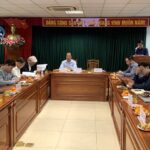On December 15, the Hanoi Institute for Socio-Economic Development Studies, in collaboration with relevant units, organized a scientific workshop on the theme “Researching and Identifying Prioritized Cultural Industry Products and Services of the Capital in the Current Situation.” This initiative is in line with Resolution No. 15-NQ/TW dated May 5, 2022, issued by the Politburo on the direction and tasks for the development of Hanoi up to 2020, with a vision to 2045. It also aligns with Resolution No. 09-NQ/TU dated February 22, 2022, of the Hanoi Party Committee on the development of the cultural industry.
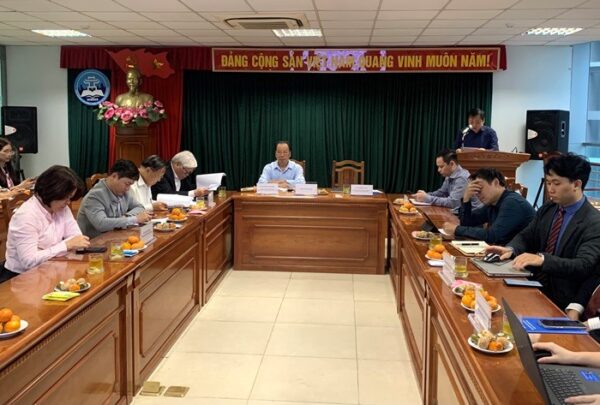
Scene of the Workshop
The workshop, led by Dr. Le Ngoc Anh, Member of the Party Committee and Director of the Hanoi Institute for Socio-Economic Development Studies, featured guest speaker Prof. Dr. Phung Huu Phu, former Central Committee Member of the Party, former Standing Vice Chairman of the Central Theoretical Council, and former Standing Secretary of the Hanoi Party Committee.
During the workshop, participants engaged in discussions on the identification of prioritized cultural industry products of the capital. Topics covered included the characteristics, classification, content of themes, and the constitutive factors of cultural industry products and services. Scientific foundations for establishing criteria to determine cultural industry products and services prioritized for development in Hanoi were also discussed. The evaluation of the current situation, proposed perspectives, tasks, and priority development solutions for certain cultural industry products and services of the capital in the new context were also addressed.
In his opening remarks, Dr. Le Ngoc Anh emphasized that the workshop represents a concrete step in implementing Resolution No. 15-NQ/TW dated May 5, 2022, of the Politburo. It aligns with the crucial directives of the Party Central Committee and the Politburo, particularly those articulated by the General Secretary during the National Cultural Conference, emphasizing that “Culture is truly the foundation, the internal resource, and the driving force for the breakthrough development of the economy, society, and international integration, placing culture on an equal footing with the economy and other crucial areas of the country.”
To implement Resolution No. 09-NQ/TU, the People’s Committee of Hanoi has developed Plan No. 217/KH-UBND, which identifies the “Cultural Industry of Hanoi as a spearhead economic sector, comprehensively developing, acting as a driving force for the development of other sectors and areas, and laying the groundwork for building Hanoi with a high quality of life, striving to contribute about 10% of the city’s GRDP.” Plan No. 217/KH-UBND also prioritizes the development of three out of six cultural industry sectors in the current context: Cultural Tourism, Gastronomy, and Performing Arts.
During the workshop, Associate Professor, Dr. Nguyen Chi My, former Head of the Hanoi Party Committee’s Propaganda Committee and former Director of the Hanoi Institute for Socio-Economic Development Studies, highlighted Hanoi as the first locality in the country to adopt Resolution No. 09-NQ/TU of the Party Committee regarding the development of the cultural industry. To ensure breakthrough, stable, and sustainable development, the prioritized products and services in the three aforementioned cultural industry sectors need to meet ten criteria: Cultural products and services must have high development potential and advantages; They must have established prestige, leave a strong impression, garner attention, and be favored by many; They should possess resonance, representativeness, and a distinct cultural identity of Hanoi; They must have the ability to promote and widely disseminate products, services, and consumption domestically, regionally, and internationally; They should contribute to shaping aesthetic and cultural development for youth; They should contribute to preserving and promoting the national culture; They must have the potential for scale expansion and high competitiveness; They should possess uniqueness with their own brand; They must be capable of connecting in production, promotion, consumption, and export of products; They should generate economic and cultural value for the city (including the scale of labor, the number of businesses, tax contribution to GRDP, and impact on the mindset, attitude, and behavior of consumers). Additionally, it is crucial to address and remove seven barriers and bottlenecks hindering the development of the cultural industry sector.
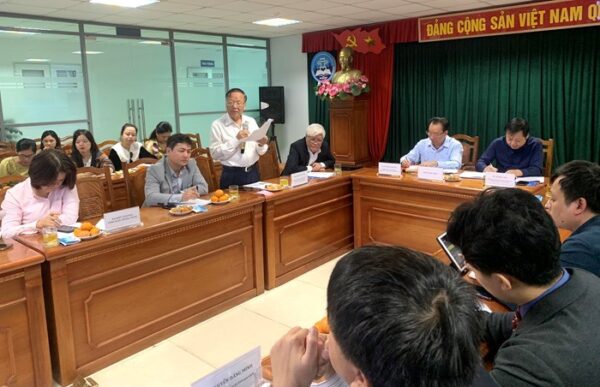
Assoc. Prof., Dr. Nguyen Chi My contributed his insights to the Workshop.
Sharing her perspective, Assoc. Prof. Dr. Tran Thi Ngoc Quyen, an expert from the Foreign Trade University, emphasized the need to enhance the quality of cultural management teams through training, improving managerial capabilities, professional competence, and expertise. The key is to change perceptions and approaches to leverage the existing potential in Hanoi’s culture and historical sites effectively.
Condensing it to five criteria for cultural industry development, Prof. Dr. Nguyen Dang Minh stressed the importance of ensuring that the industry serves tourists in terms of what to see, eat, play, buy, and understand what to take away from Hanoi. Some advanced countries, such as Japan, after reaching economic development milestones, shifted their focus back to developing traditional culture. Hanoi should follow this path, reviving the traditional cultural features of the capital.
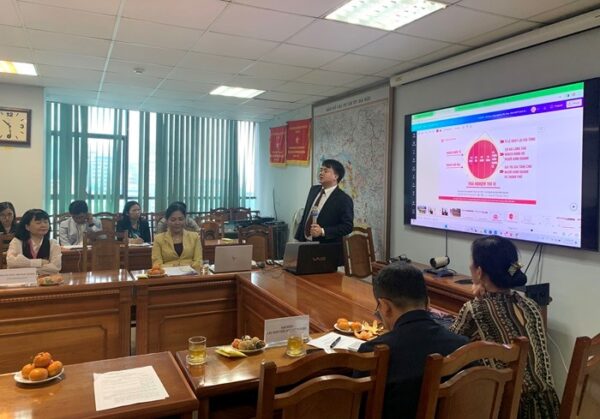
Assoc. Prof., Dr. Nguyen Dang Minh spoke at the Workshop.
Composer Quoc Trung pointed out that cultural products differ from services. Cultural products have sustainability, while services merely address people’s preferences. A culturally appealing product, reaching the pinnacle of art and creativity, requires meticulous preparation. Additionally, there is a need to change the perception of cultural management authorities, emphasizing that cultural products must meet the public’s enjoyment needs. The current mechanisms constrain the role of cultural creators, necessitating public-private collaboration for cultural industry development.
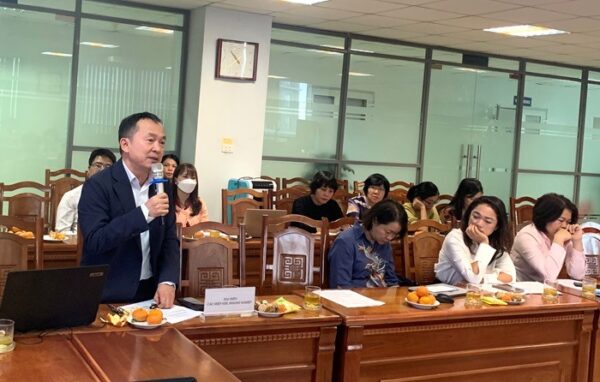
Composer Quoc Trung spoke at the Workshop.
In agreement, Dr. Nguyen Viet Chuc emphasized the importance of enhancing public-private collaboration, stating that for successful cultural industry development, effective collaboration between the public and private sectors is essential. Moreover, Hanoi should establish mechanisms to attract artists and creative individuals through regulations defining authority, responsibilities, accompanying rights, and the recognition and acknowledgment of their contributions.
Thu Uyen

